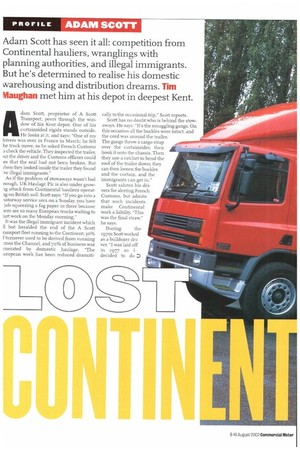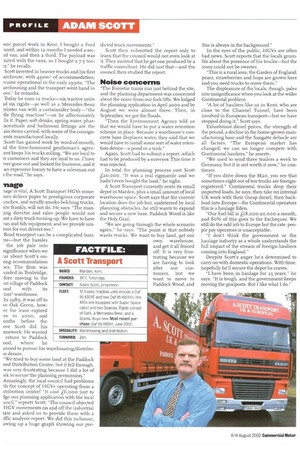Adam Scott has seen it all: competition from Continental hauliers,
Page 32

Page 34

If you've noticed an error in this article please click here to report it so we can fix it.
wranglings with planning authorities, and illegal immigrants. But he's determined to realise his domestic warehousing and distribution dreams. Tim Vlaughan met him at his depot in deepest Kent.
Adam Scott, proprietor of A Scott Transport, peers through the window of his Kent depot. One of his curtainsided rigids stands outside. He looks at it, and says: One of my [rivers was over in France in March; he felt he truck move, so he asked French Customs a check the vehicle. They inspected the trailer, iut the driver and the Customs officers could ee that the seal had not been broken. But ;hen they looked inside the trailer they found ye illegal immigrants."
As if the problem of stowaways wasn't bad nough, UK Haulage Plc is also under growig attack from Continental hauliers operatig on British soil. Scott says: " If you go into a iotorway service area on a Sunday, you have job squeezing a fag paper in there because iere are so many European trucks waiting to tart work on the Monday morning."
It was the illegal immigrant incident which 11 but heralded the end of the A Scott ransport fleet running to the Continent; 30% f turnover used to be derived from running zoss the Channel, and 70% of business was nerated by domestic haulage. "The uropean work has been reduced dramati
cally to the occasional trip," Scott reports.
Scott has no doubt who is behind the stowaways. He says: "It's the smuggling gangs. On this occasion all the buckles were intact, and the cord was around the trailer.
The gangs throw a cargo strap over the curtainsider, then hook it onto the chassis. Then they use a ratchet to bend the roof of the trailer down; they can then loosen the buckles and the curtain, and the immigrants can get in."
Scott salutes his drivers for alerting French Customs, but admits that such incidents make Continental work a liability. "This was the final straw," he says.
During the 1970s Scott worked as a bulldozer driver. "I was laid off in 1977 so I decided to do n-ne parcel work in Kent. I bought a Ford -ansit, and within 12 months I needed a sec-id van, and then a third. The payload was anted with the vans, so I bought a 7.5 ton.r," he recalls.
Scott invested in heavier trucks and his first arehouse, with 4501/12 of accommodation, !came operational in the early 1990s. "The arehousing and the transport went hand in ove," he remarks.
Today he runs 12 trucks—six tractive units id six rigids—as well as a Mercedes-Benz 3rinter van with a curtainsider body—"the tie flying machine"—as he affectionately Rs it. Paper, soft drinks, spring water, phar.aceuticals and bathroom fittings are the am items carried, with some of the consignents manufactured locally.
Scott has gained work by word-of-mouth, id the time-honoured gentleman's agreeent keeps his trucks rolling. "We are loyal to ir customers and they are loyal to us. I have ver gone out and looked for business, and it an expensive luxury to have a salesman out the road," he says.
liar)
nage is vital. A Scott Transport HGVs somenes deliver paper to prestigious corporate unches, and scruffy smoke-belching trucks, rite frankly, will not do. He says: "The man;ing director and sales people would not ant a dirty truck turning up. We have to have an and tidy equipment, and we provide unirms for our drivers too."
Road transport can be a complicated busi • ss—but the hassles the job pale into significance when we • ar about Scott's oniing accommodation 3es. The firm was unded in Tonbridge, fore moving to the !nt village of Paddock
ood with its om2 warehouse.
In 1989, it was off to ve Oak Green, hower the lease expired ire in 2000, and onths before the ove Scott did his imework. He wanted return to Paddock ood, where he anned to pursue his warehousing/distribuin dream.
A Scott Transport
BASED: Marden, Kent.
FOUNDED: 1977, Tonbridge.
CONTACT: Adam Scott, proprietor.
SPECIALITY: Warehousing and distribution.
TURNOVER: £1m.
"We tried to buy seine land at the Paddock ood Distribution Centre, but it fell through. was very frustrating because I did a lot of )rk to secure the planning permission." Amazingly, the local council had problems th the concept of HGVs operating from a stribution centre! "It cost /6,000 just to ige our planning application with the local lined," reports Scott. "The council objected HGV movements on and off the industrial tate and asked us to provide them with a iffic analysis report. We did this in-house, awing up a huge graph showing our pre
dicted truck movements."
Scott then submitted the report only to learn that the council would not even look at it. They insisted that he get one produced by a traffic consultant. He did just that—and the council then studied the report.
Noise concerns
"The Eurostar trains run just behind the site, and the planning department was concerned about the noise from our fork-lifts. We lodged the planning application in April 2000 and by August we were almost there. Then, in September, we got the floods.
"Then the Environment Agency told us that we would have to put a water retention scheme in place. Because a warehouse's concrete base displaces water, they said that we would have to install some sort of water retention device—a pond or a tank?
Again, Scott had to submit a report, which had to be produced by a surveyor. This time it was rejected.
In total the planning process cost Scott £20,000. "It was a real rigmarole and we hadn't even bought the land," he sighs.
A Scott Transport currently rents its small depot in Marden, plus a small amount of local warehouse space. Scott says that the current location does the job but, undeterred by local planning obstacles, he still wants to expand and secure a new base. Paddock Wood is like the Holy Grail.
"We are going through the whole scenario again," he says. "The point is that nobody wants trucks. We want to buy land, get our own warehouse, and get it all fenced off. It is very frustrating because we are having to look after our customers, but we want to move to Paddock Wood, and
FACTFILE.
.
this is always in the background."
In the eyes of the public, HGVs are often bad news. Scott reports that the locals grumble about the presence of his trucks—but the irony could not be sweeter.
"This is a rural area, the Garden of England; pears, strawberries and hops are grown here and you need trucks to move them."
The displeasure of the locals, though, pales into insignificance when you look at the wider Continental problem.
"A lot of hauliers like us in Kent, who are close to the Channel Tunnel, have been involved in European transport—but we have stopped doing it," Scott says.
Exhorbitant diesel prices, the strength of the pound, a decline in the home-grown manufacturing base and the Sangatte debacle are all factors. "The European market has changed; we can no longer compete with Continental hauliers," he asserts.
"We used to send three trailers a week to Germany, but it is not worth it now," he continues.
"If you drive down the M2o, you see that sometimes eight out often trucks are foreignregistered." Continental trucks drop their imported loads, he says, then take on internal UK work with their cheap diesel, then backload into Europe—for Continental operators this is a haulage Eden.
"Our fuel bill is 118,000-20,000 a month, and 8o% of this goes to the Exchequer. We still do the odd job to Europe but the rate people pay operators is unacceptable.
"I don't think the government or the haulage industry as a whole understands the full impact of the stream of foreign hauliers coming into England."
Despite Scott's anger he's determined to carry on with domestic operations. With time, hopefully he'll secure the depot he craves.
"I have been in haulage for 25 years," he says. "It is tough, and the government keeps moving the goalposts. But I like what I do."
















































































































































